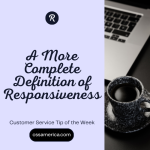
Let’s say that I’m the customer, so it’s important to listen to what I say when we’re talking. However, sometimes there are hidden words within the words. I’m not talking about the tone of voice that I use as much as I’m talking about the words I choose.
Sometimes you can read into what I’m saying by listening closely to specific ways I convey my message. Here are a few examples:
- One Word Answers – Assuming you’re not asking me questions that simply require a “Yes/No” response, when I reply with 1-word answers, I may be upset, impatient, or don’t yet trust you. I may not like the questions or direction of the conversation.
- “Um…uhh…” – These pauses/phrases suggest I’m uncertain, or I’m trying to control my emotions.
- Use of Absolutes – This can be a sign that I’m being defensive (such as “I never” or “I definitely”) or argumentative (such as “You never” or “You always”).
- “Of course…” – Maybe I’m insulted by the question such as “Of course I did that. How dare you ask!”
- Repeating My Question – If I repeat my question, I may think you’re not listening, or I don’t like your answer.
- “Understand” (as in “I don’t understand…” or “Help me understand…”) – I may be confused, or I could be probing for details because I disagree.
- “Hold on” or “Wait” – I may not understand, or I may feel you’re rushing me.
- “Can you repeat that?” – I’m unsure that I understand, or I’m not paying attention.
When you hear these phrases or get these reactions, think about the deeper meaning.
Read the phrase to best respond to the person. Read me like a book.
Signup for FREE Tips! Contact Us More Resources for You Visit Our Home Page























